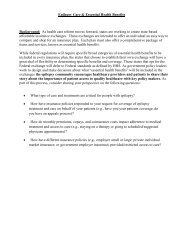Legal Rights of Children with Epilepsy in School & Child Care
Legal Rights of Children with Epilepsy in School & Child Care
Legal Rights of Children with Epilepsy in School & Child Care
Create successful ePaper yourself
Turn your PDF publications into a flip-book with our unique Google optimized e-Paper software.
<strong>Legal</strong> <strong>Rights</strong> <strong>of</strong> <strong><strong>Child</strong>ren</strong> <strong>with</strong> <strong>Epilepsy</strong> <strong>in</strong> <strong>School</strong> and <strong>Child</strong> <strong>Care</strong><br />
process. Some courts, however, have taken a very expansive view <strong>of</strong> exhaustion<br />
requirements, and attorneys should review the relevant law <strong>in</strong> their circuit before<br />
proceed<strong>in</strong>g. See the Selected Cases section at the end <strong>of</strong> this chapter for<br />
additional <strong>in</strong>formation.<br />
8.26Q: Does a parent need a lawyer to file a compla<strong>in</strong>t or to go to mediation or a<br />
due process hear<strong>in</strong>g?<br />
A: No. A parent does not need an attorney to file a compla<strong>in</strong>t, go to mediation or go<br />
to a due process hear<strong>in</strong>g. However, many parents feel more comfortable be<strong>in</strong>g<br />
represented by counsel at due process hear<strong>in</strong>gs because they are complex, school<br />
districts are usually represented by counsel, and because parents may, <strong>in</strong> certa<strong>in</strong><br />
circumstances, be liable for the attorney’s fees <strong>of</strong> the district. Especially <strong>in</strong> a<br />
state <strong>in</strong> which there is only one level <strong>of</strong> due process hear<strong>in</strong>g before an appeal to<br />
court, parents may be particularly concerned about ensur<strong>in</strong>g that they present the<br />
strongest case possible at the due process hear<strong>in</strong>g and may not feel that they can<br />
do so <strong>with</strong>out representation.<br />
8:27Q: What can a parent do if he or she wants a lawyer but cannot afford one?<br />
A: The school district must <strong>in</strong>form a parent about any free or low-cost legal or other<br />
relevant services that are available <strong>in</strong> the area if the parent requests the<br />
<strong>in</strong>formation or if the parent or the school district requests a due process hear<strong>in</strong>g.<br />
34 C.F.R. 300.507(b). The parent may also contact the <strong>Epilepsy</strong> Foundation for<br />
a referral to an attorney that may be able to provide some level <strong>of</strong> free legal<br />
services. For more <strong>in</strong>formation, see the <strong>in</strong>troduction to this manual.<br />
8.28Q: Can a parent sue a school district based on a claim <strong>of</strong> personal <strong>in</strong>jury<br />
seek<strong>in</strong>g monetary damages for its failure to provide required medication or<br />
care to a student <strong>with</strong> epilepsy?<br />
A: Yes. A school district or its employees may have tort liability under state law if<br />
there is a failure to take steps to prevent avoidable harm, or if the school district<br />
has a policy that prohibits a student from carry<strong>in</strong>g medication when that<br />
medication is necessary for the student’s medical care—but the district is not<br />
required to provide all care that could conceivably be required. 50 See, e.g. Taylor<br />
v. Altoona Area <strong>School</strong> District, 05-350J (W.D. Pa. 2007), 48 IDELR 185 (court<br />
upheld the parent’s claim aga<strong>in</strong>st her child’s teacher, who had refused to allow<br />
50 State tort remedies may be available when school <strong>of</strong>ficials had a duty to act and breached that duty,<br />
provided that school <strong>of</strong>ficials do not have immunity from tort suits and other requirements for br<strong>in</strong>g<strong>in</strong>g a<br />
claim are met. Tort law varies from state to state, especially <strong>with</strong> respect to whether a public or private<br />
school or its employees are immune from liability. Negligence claims may be asserted when schools fail to<br />
provide care and treatment for students. Unlike anti-discrim<strong>in</strong>ation law, tort claims are only available after<br />
a student has suffered actual harm, such as physical <strong>in</strong>jury.<br />
118








